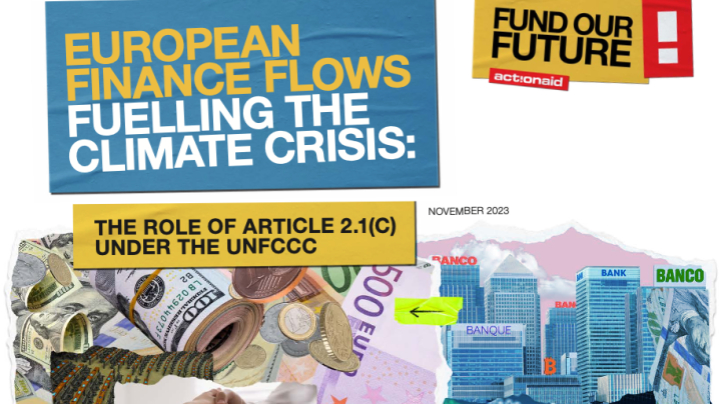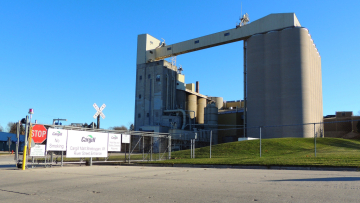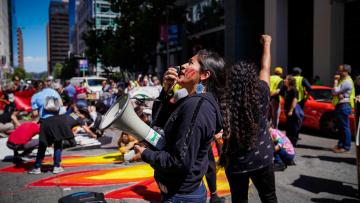European Finance Flows fuelling the climate crisis: The role of Article 2.1c under the UNFCCC
ActionAid Press Office, +44 7586107955 (mobile) or +263776665065 (WhatsApp)
Spokespeople
- Teresa Anderson, Global Lead on Climate Justice at ActionAid International and one of the report authors
- Hamdi Benslama, EU Advocacy Advisor at ActionAid International and a co-author of the report

ActionAid Press Office, +44 7586107955 (mobile) or +263776665065 (WhatsApp)
Spokespeople
- Teresa Anderson, Global Lead on Climate Justice at ActionAid International and one of the report authors
- Hamdi Benslama, EU Advocacy Advisor at ActionAid International and a co-author of the report
Key messages:
- As the EU calls on COP28 to make progress on fixing the world’s financial flows, a new report shows this is not matched by the EU’s own efforts to regulate its financial industry.
- Research shows the fossil and industrial agriculture industries in the Global South are receiving 4 times more financing from European banks than governments are receiving as climate finance from the EU.
- In the 7 years since the Paris Agreement was signed, European banks have provided US$327 billion (€281 billion) of financing to fossil fuel and industrial agriculture activities in the Global South. Top European banks funding the climate crisis include BNP Paribas, Société Générale, Crédit Agricole, Deutsche Bank and Santander.
As the EU calls on COP28 climate negotiations to make progress on stopping climate-harming finance flows, its own financial industry continues to fund fossil fuels and other carbon intensive sectors, ActionAid’s report shows.
The EU, which has been vocal on the implementation of Article 2.1c of the Paris Agreement to make “finance consistent with a pathway towards low greenhouse gas emissions and climate-resilient development”, must lead the way.
The report, “European Finance Flows fuelling the climate crisis: The role of Article 2.1c under the UNFCCC” finds that annual financing provided by European banks to fossil fuel and industrial agriculture activities in the Global South comes to an average of US$46.7 billion (€40.2 billion) per year. This is 4 times the US$11.26 billion (€9.7 billion) annual average that the EU and its member countries have provided as the real value (grant-equivalent) value of climate finance to countries in the Global South.
The EU’s efforts to move the Article 2.1c agenda forward are both helpful and problematic at the same time. ActionAid welcomes efforts to shift the world’s harmful financial flows. However, the report finds that the EU is also attempting to use the Article 2.1c agenda to try to reduce its own obligations to provide its fair share of grant-based public finance.
Under parallel negotiations to develop a new post-2025 climate finance goal, developed and developing countries disagree on the extent to which private finance, including loans provided by banks, should count towards climate finance targets. For countries already being pushed into debt by the impacts of climate change, finance in the form of grants is the most useful type of support. Developing countries are understandably concerned that the EU’s efforts to green private finance under 2.1c will be used to count towards the New Collective Quantified Goal on finance (NCQG), relating to Article 9 of the Paris Agreement.
Teresa Anderson, Global Lead on Climate Justice at ActionAid International and one of the report’s authors, said:
“The world’s money is flowing in the wrong direction. Banks often claim that they are addressing climate change, but their continued financing of fossil fuels and industrial agriculture is condemning communities in Africa, Asia and Latin America to the cruel combination of landlessness, deforestation, water pollution and climate change. European finance flows are a big part of the planet’s problem, channelling far more funds to the cause of climate change in the Global South than to the solutions. The EU is preaching water while still drinking wine.
“COP28 presents a key opportunity to fix the planet’s climate-harming finance flows. But this should not be used as an excuse for the EU and other wealthy countries to wriggle out of their responsibility to provide real support to the countries suffering from climate change impacts. We need to fix the harmful finance flows and scale up real climate finance for solutions at the same time – not trade these vital agendas off against each other.”
The report calls for:
- COP28 to make progress on the Paris Agreement commitments under Article 2.1c, through a series of measures including new regulations and policies to phase out financing to fossil fuels and other high-emitting activities such as harmful industrial agriculture; the rapid and equitable phase-out of fossil fuel subsidies globally; phase out fossil fuel lending by public finance institutions; debt cancellation and restructuring; and creation of an effective UN Tax Convention to prevent tax avoidance, tax evasion, and illicit financial flows.
- The EU and its Member States to significantly increase their public, grant-based finance to meet a fair share of their commitments under Article 9.1 of the Paris Agreement, and these contributions should not be conditional on Article 2.1c decisions.
- The EU and its Member States to take domestic action to address its climate-harming finance flows, in particular by including banks and financial institutions in the Corporate Sustainability Due Diligence Directive (CSDDD) on human rights and environment.
You can download the report here.
Re-published from the original press release on the ActionAid website here.




